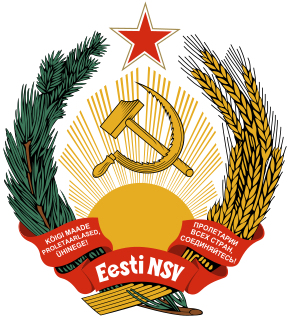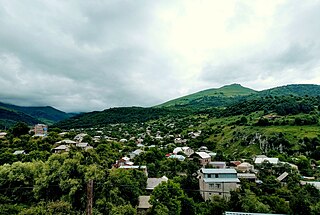 |
|---|
| |
Bolshevik Nuclei (in French: Noyau-Bolshevik) was a small clandestine Marxist group in Senegal. It published Ferment. At the time of the 1988 elections it promoted abstention.
 |
|---|
| |
Bolshevik Nuclei (in French: Noyau-Bolshevik) was a small clandestine Marxist group in Senegal. It published Ferment. At the time of the 1988 elections it promoted abstention.

The Bolsheviks, also known in English as the Bolshevists, were a radical, far-left, and revolutionary Marxist faction founded by Vladimir Lenin that split from the Menshevik faction of the Marxist Russian Social Democratic Labour Party (RSDLP), a revolutionary socialist political party formed in 1898, at its Second Party Congress in 1903.

The October Revolution, officially known as the Great October Socialist Revolution under the Soviet Union, also known as the Bolshevik Coup, the Bolshevik Revolution, the October Uprising, the October Coup or Red October, was a revolution in Russia led by the Bolshevik Party of Vladimir Lenin that was instrumental in the larger Russian Revolution of 1917–1923. It was the second revolutionary change of government in Russia in 1917. It took place through an armed insurrection in Petrograd on 7 November 1917 [O.S. 25 October]. The rise of the Bolshevik and anti-Bolshevik factions was the precipitating event of the Russian Civil War.

The Russian Revolution was a period of political and social revolution that took place in the former Russian Empire and began during the First World War. Commencing in 1917 with the fall of the House of Romanov and concluding in 1923 with the Bolshevik establishment of the Soviet Union, the Russian Revolution was a series of two revolutions: the first of which overthrew the imperial government and the second placed the Bolsheviks in power.

The Russian Civil War was a multi-party civil war in the former Russian Empire immediately after the two Russian revolutions of 1917, as many factions vied to determine Russia's political future. The two largest combatant groups were the Red Army, fighting for the Bolshevik form of socialism led by Vladimir Lenin, and the loosely allied forces known as the White Army, which included diverse interests favouring political monarchism, capitalism and social democracy, each with democratic and anti-democratic variants. In addition, rival militant socialists, notably Makhnovia anarchists and Left SRs, as well as non-ideological Green armies, opposed the Reds, the Whites and foreign interventionists. Thirteen foreign nations intervened against the Red Army, notably the former Allied military forces from the just-concluded World War with the goal of re-establishing the Eastern Front. Three foreign nations of the Central Powers also intervened, rivaling the Allied intervention with the main goal of retaining the territory they had received in the Treaty of Brest-Litovsk.

Agitprop refers to an intentional, vigorous promulgation of ideas. The term originated in Soviet Russia where it referred to popular media, such as literature, plays, pamphlets, films, and other art forms, with an explicitly political message in favor of communism.

Nestor Ivanovych Makhno, commonly known as Bat'ko Makhno, was a Ukrainian anarchist revolutionary and the commander of an independent anarchist army in Ukraine from 1917–21.

Sergo Konstantinovich Ordzhonikidze, born Grigol Konstantines dze Orjonikidze, was a Georgian Bolshevik and Soviet politician.

The All-Union Communist Party of Bolsheviks is a Marxist–Leninist and anti-revisionist political party operating in Russia and other former Soviet states. It was founded in November 1991 and led by Nina Andreyeva, a university teacher who was well known for her 1988 letter "I cannot give up my principles".

Makhnovshchina or Makhnovia, resulted from an attempt to form a stateless anarchist society in parts of Ukraine during the Russian Revolution of 1917–1923. It existed from 1918 to 1921, during which time free soviets and libertarian communes operated under the protection of Nestor Makhno's Revolutionary Insurrectionary Army. The area had a population of around seven million.

The Communist Party of Estonia was a political party in Estonia.
The 16th Congress of the Russian Communist Party (Bolsheviks) was held during 26 June - 13 July 1930 in Moscow. The congress of the Russian Communist Party (Bolsheviks) was attended by 1,268 voting delegates and 891 delegates with observer status. It elected the 16th Central Committee.

Shahumyan is a town in the Lori Province of Armenia. The village was populated by Azerbaijanis prior to their massacre and exodus after the outbreak of the Nagorno-Karabakh conflict. In 1988-1989 Armenian refugees from Azerbaijan settled in the village.

No. 221 Squadron was a Royal Air Force squadron that saw service in both the First and Second World Wars. Its motto was "From sea to sea".
Following the October Revolution of 1917, the Bolshevik seizure of power led to the Russian Civil War which continued until 1922. The victory of the Bolshevik Red Army enabled them to set up the Union of Soviet Socialist Republics (USSR). Throughout the civil war various religions, secularists and anti-clericalists of the Bolsheviks played a key role in the military and social struggles which occurred during the war.
The Party of Left Socialist-Revolutionaries was a revolutionary socialist political party formed during the Russian Revolution.

National Bolshevism, whose supporters are known as National Bolsheviks or NazBols, is a radical political movement that combines ultranationalism and communism.

The All Russian Constituent Assembly was a constitutional body convened in Russia after the October Revolution of 1917. It met for 13 hours, from 4 p.m. to 5 a.m., 18–19 January [O.S. 5–6 January] 1918, whereupon it was dissolved by the All-Russian Central Executive Committee, making the Third All-Russian Congress of Soviets the new governing body of Russia.

The Socialist Revolutionary Party, or Party of Socialist-Revolutionaries was a major political party in late Imperial Russia, and both phases of the Russian Revolution and early Soviet Russia.
War communism or military communism was the economic and political system that existed in Soviet Russia during the Russian Civil War from 1918 to 1921.

The Mensheviks, also known as the Minority were one of the three dominant factions in the Russian socialist movement, the others being the Bolsheviks and Socialist Revolutionaries.